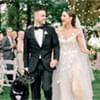Is your dog afraid of fireworks? Here are some tips
- Chiara Buosi
- /
- December 29, 2019

New Year's eve is now near and it's tradition to say goodbye to the year just past by firing fireworks.
For many dogs what is a fascinating sight for us, in the night sky, soon becomes terror because, by virtue of a much more refined and sensitive hearing than humans, they perceive the fireworks in a more amplified and intense way. They whine, run uneasily, tremble and are in a state of agitation.
Some municipalities, including the one where I live, have issued provisions (in our case permanent) relating to the ban on using fireworks. This is to protect our safety, respect for our four-legged friends and the environment.
What to do if fireworks are not prohibited in your city?
How to safeguard our four-legged friends from fear, stress and panic attacks?
Here are some useful tips, but remember, if you know that your dog is particularly sensitive to this problem, contact a Behavioral Veterinary.
What to do if the dog is afraid of firework?
Keep it as far as possible from the areas where fireworks are exploded (easy to say but not always possible);
Don't leave him alone: he may have uncontrolled reactions and injure himself;
Don't keep it tied(I never do this but this is anothor matter);
Do not scold him or console him: reassuring him in these circumstances is equivalent to rewarding him at the moment when he is extremely agitated!
Let him hide in the place that he considers "safe" (even if it is usually forbidden);
If possible try to make him take a long walk in the afternoon: he will be more tired and less responsive to the sound of fireworks;
Try to distract him with smells / rewards: shift his attention to the sense of smell and not to the hearing;
Try to distract him by keeping him busy with the game or some other enjoyable activity;
Reduce the effect of fireworks by lowering the blinds, closing the shutters, drawing the curtains;
Try to overwhelm the effect of the fireworks with sounds more familiar to him, for example by keeping the radio or TV on (do not overdo the volume!);
Always show calm and tranquility: the dog must understand that everything is normal;
Make sure that your dogs are microchipped and that their microchip details are up to date;
Avoid ABSOLUTELY from administering drugs without the advice of a competent veterinary. There are sedatives for dogs, to be used in special cases, but only your veterinarian will be able to advise you if and how to use them.
Hoping that these tips will help you, I wish you a wonderful 2020!
About the Author

Chiara Buosi
In continuous search for elegance, for two and four legs. I design and realize accessories for our four-legged friends (currently only in the canine version) to give them a touch of style while respecting their dignity.




